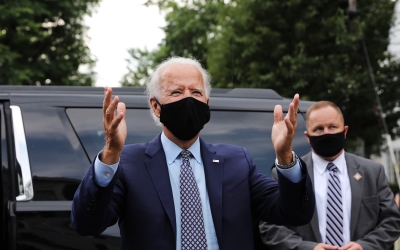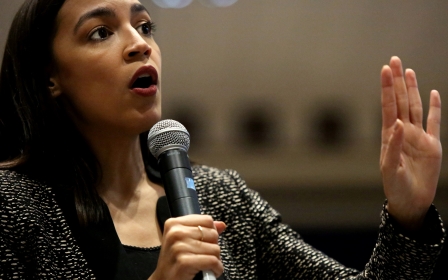Israel lobby clashes with US Democrats over Netanyahu's annexation plan

As Israel moves to annex parts of the occupied West Bank, it is becoming increasingly difficult to find any Democrat in Washington who does not oppose Israeli Prime Minister Benjamin Netanyahu's plans.
Even mainstream pro-Israel organisations and key US legislators who are usually unwavering in their support for the Israeli government have denounced the move.
Yet the American Israel Public Affairs Committee (AIPAC), which purports to be bipartisan, is spearheading the campaign to push back against efforts by Democratic members of Congress to thwart the planned annexation.
This week, the group has been rallying its supporters against legislation proposed by Democratic Senator Chris Van Hollen that would ensure US aid to Israel does not contribute to annexation.
In multiple social media posts, many featuring photos of masked Palestinian fighters, AIPAC called on followers to contact their representatives in Washington and urge them to reject Van Hollen's proposal.
New MEE newsletter: Jerusalem Dispatch
Sign up to get the latest insights and analysis on Israel-Palestine, alongside Turkey Unpacked and other MEE newsletters
Last week, a group of Democratic senators introduced the amendment to the US military budget for 2021 that would prohibit the use of American funds "to deploy defense articles, services or training" in annexed territories in the West Bank or to facilitate their annexation.
The Van Hollen measure was backed by progressives including Senators Bernie Sanders and Elizabeth Warren, as well as several mainstream figures from the centre of the Democratic Party, including former vice-presidential nominee Tim Kaine.
'AIPAC claims that it supports a two-state solution, but it refuses to take any action to ensure that remains a real possibility'
- Senator Van Hollen's office
AIPAC moved quickly to condemn the amendment. In its call for action, it accused Van Hollen and his colleagues of undermining Israel's security.
"The Van Hollen amendment politicizes US support for Israel’s security and goes far beyond current law in ways that damage American interests, risk Israel's security, and make peace less likely," AIPAC said in its message to supporters.
"Please urge your senators to stand with Israel and oppose this dangerous amendment."
Van Hollen, a Maryland Democrat, has been a strong supporter of Israel since he was first elected to the House of Representatives in 2002. Moreover, the amendment would not decrease the assistance - worth $3.8bn a year - that Israel receives.
Still, the mere mention of attaching conditions to financial aid appeared to spur AIPAC into action.
Aid to Israel
Late last month, Congresswoman Alexandria Ocasio-Cortez and 12 other legislators sent a letter to Secretary of State Mike Pompeo pledging to impose human rights conditions on Israel if annexation were to materialise.
While running for the Democratic presidential nomination this year, Senator Sanders championed the idea of conditioning aid to Israel in order to pressure it to change its policies against Palestinians, demonstrating the viability of the position on the left.
Van Hollen's proposal does not go as far as the Ocasio-Cortez letter or what some Palestinian rights advocates are calling for. The senator's office stressed that the amendment would maintain Washington's "existing commitments to Israel" as outlined by a memorandum of understanding signed by President Barack Obama in 2016.
Van Hollen's office hit back at AIPAC and accused President Donald Trump of violating "longstanding bipartisan American policy in support of the rule of law and a negotiated two-state solution" by supporting Israel's annexation plan.
"AIPAC claims that it supports a two-state solution, but it refuses to take any action to ensure that remains a real possibility," Van Hollen's office told MEE earlier this week.
"By contrast, this amendment reconciles our strong support for a safe and secure Israel, and our commitment to a negotiated settlement between Israel and the Palestinians to establish two states for two peoples living side by side in peace."
Republicans back annexation
The Trump administration has not explicitly endorsed the annexation plan, with Pompeo twice dismissing questions on the issue over the past few months by framing it as an "Israeli decision".
But critics of Netanyahu's plan argue that annexation is far from an Israeli matter becuse it violates a basic tenet of international law that prohibits the acquisition of land by force.
Introducing the amendment on 2 July, Van Hollen delivered a 38-minute speech on the floor of the Senate, stressing that failure to oppose annexation and uphold international law would undermine the "rules-based system" and open the door for a "global jungle".
"I do not believe that the United States government and the United States taxpayer should be aiding and abetting Prime Minister Netanyahu's plan to unilaterally annex the West Bank," the senator said.
Senior Democrats, including Senate Minority Leader Chuck Schumer and the ranking member of the Foreign Relations Committee, Bob Menendez, who are otherwise staunchly pro-Israel, have also come out against annexation.
Meanwhile, a majority of Republicans in the House of Representatives have endorsed Netanyahu's plan, backing Israeli leaders to "make sovereign decisions independent of outside pressure".
"The Trump administration’s new approach offers the promise of success where past efforts have failed, recognizing Israel’s vital national and security interests while providing for a fair and reasonable compromise with the Palestinians, should Palestinian leadership opt finally to prioritize peace," a letter addressed to Netanyahu and signed by 120 House Republicans said earlier in June.
"It is our hope that this plan brings peace, security, and prosperity to a region that has long endured conflict. As dedicated friends of the Jewish state, we reaffirm our steadfast commitment to the relationship between our two nations and Israel’s right to sovereignty and defensible borders."
Trump's "deal of the century" plan would allow Israel to retain all of its West Bank settlements, as well as the Jordan Valley, in exchange for recognising a Palestinian state in patches of disjointed territories under de-facto Israeli control.
Losing bipartisan support
The Israeli government had set a 1 July deadline to start the process of applying sovereignty to parts of the Palestinian territories, but it appears to have postponed the move amid global outrage.
The stark contrast between the Republican Party's support for annexation and Democrats' opposition to Netanyahu's plans highlights the difficulties that AIPAC is facing in keeping support for Israel even remotely bipartisan.
The pro-Israel lobby currently seems to be going after Democrats exclusively. Late in June, the group accused Ocasio-Cortez of making a "two-state solution less likely" with her letter calling for consequences to follow annexation.
And early in 2020, AIPAC likened Democratic legislators Rashida Tlaib, Ilhan Omar and Betty McCollum to the Islamic State militant group.
'AIPAC has lost control of the Democratic Party debate. And right now they're flailing wildly because they're scared'
- James Zogby, AAI president
The pro-Israel organisation did not respond to MEE's request for comment.
James Zogby, president of the Arab American Institute (AAI), said AIPAC's influence in Washington is waning as the group becomes increasingly partisan.
"AIPAC has lost control of the Democratic Party debate," Zogby told MEE. "And right now they're flailing wildly because they're scared. And that's good. They can't save somebody they want to save, and they can't beat somebody they want to beat."
Zogby said AIPAC would end up like the National Rifle Association (NRA), a pro-gun lobby that is influencial in Republican politics but has become public enemy number one for most Democrats who advocate strict gun laws.
He said politicians pushing to keep unconditional support for Israel a bipartisan issue are fighting a losing battle because public opinion on the Democratic side had shifted "irreversibly", with people becoming increasingly critical of Israel's human rights abuses.
"You cannot get the horses back in the barn. The change has already occurred among young people, among Black people, among Latinos, among progressive Jews," Zogby said.
Middle East Eye delivers independent and unrivalled coverage and analysis of the Middle East, North Africa and beyond. To learn more about republishing this content and the associated fees, please fill out this form. More about MEE can be found here.





